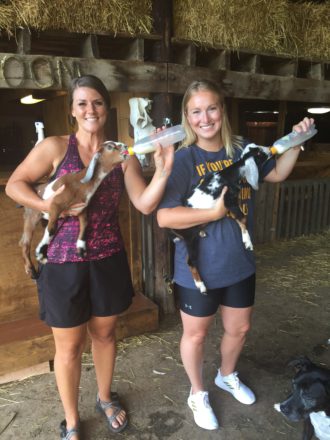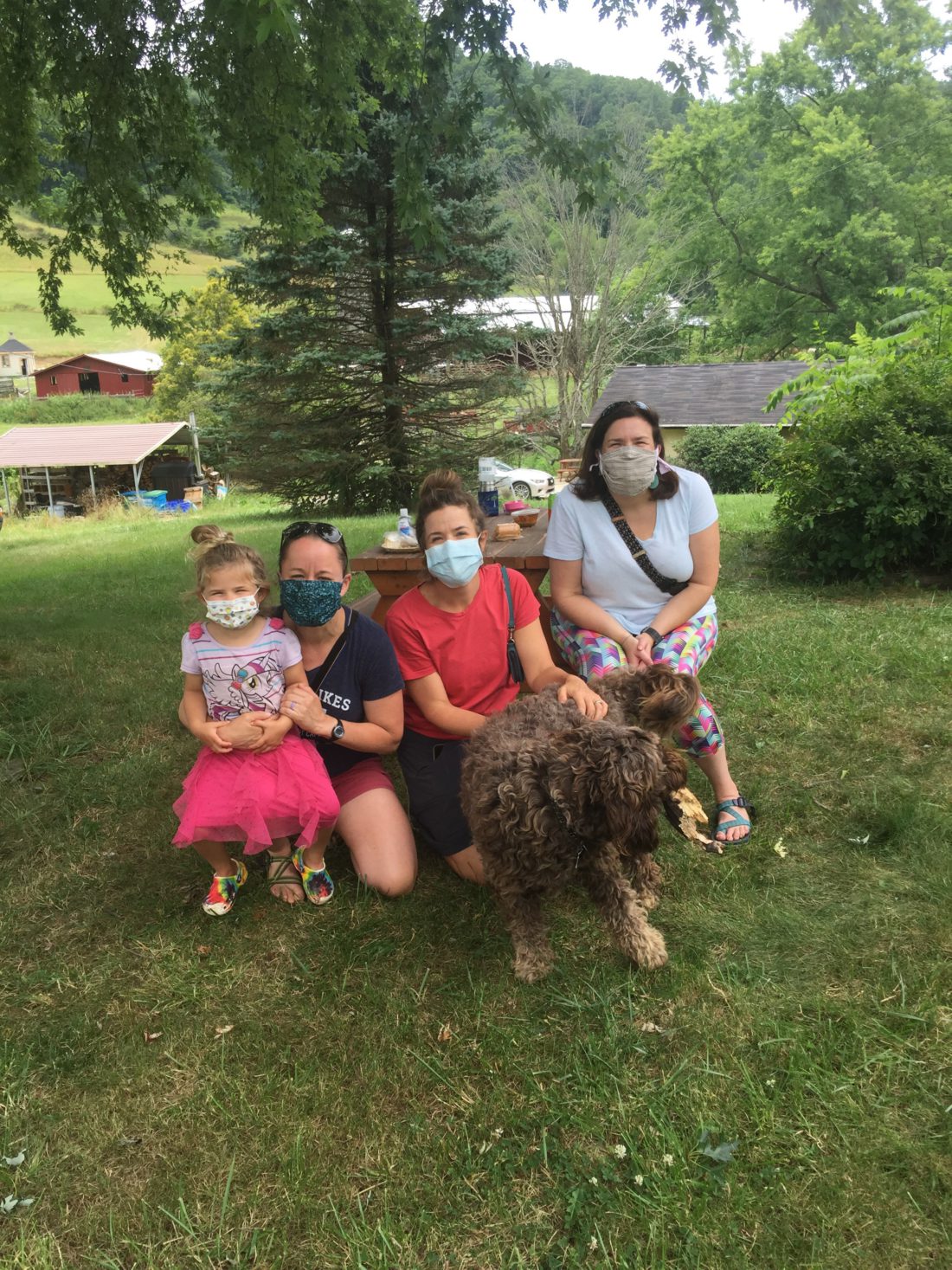Picking baskets of blueberries, gathering armfuls of sunflowers and getting personal with sociable goats are all normal summertime activities in Western North Carolina. Many of the area’s small farms depend on welcoming the public for tours, dinners, U-pick adventures, workshops and overnight stays as a fundamental income stream. This year, however, the coronavirus pandemic has drastically altered WNC’s agritourism landscape.
“Agritourism is one of the top five revenue sources for small farms that participate in the Carolinas’ local food systems,” says Roland McReynolds, executive director of the Carolina Farm Stewardship Association. “This has been a trend for at least 15 years and has accelerated in the last five to 10 years.” But a report released in late June by the CFSA shows that COVID-19 has upended this increasingly popular strategy.
The pandemic decreased overall weekly sales for three-quarters of small and midscale farms surveyed in North and South Carolina. Growers reliant on agritourism were some of the hardest hit, with 77% reporting diminished income. Among the 38 farms that rated agritourism as a “very important” market channel and said they’d seen a downturn, 82% saw total farm revenue fall by more than $1,000 per week.
And the future, according to the report, does not look particularly rosy: “Given the potential for stay-at-home orders to be reimposed if infection rates spike again at any point before a vaccine is widely available, there is ample cause for concern that small farms will not see sales through this market channel return to pre-pandemic levels for some time.”
Nevertheless, WNC’s resilient small farms are looking for ways to bounce back. Data from the Appalachian Sustainable Agriculture Project’s Local Food Research Center shows that 21% of the organization’s 800 WNC Appalachian Grown farms depend on agritourism for income, and all of them are charting new courses right now, says Molly Nicholie, ASAP’s Local Food Campaign program director. “There is no current standard across farms, as each is determining their comfort level with offering agritourism activities during the pandemic, and of course, that depends on their operation, customer base and activities.”
Nicholie points out that the unpredictable COVID-19 situation prompted ASAP to cancel its annual Farm Tour, which typically draws about 1,500 locals and tourists each June to farms across the region. “Many farms are trying to figure out how to adapt or shift gears, with many looking for alternative markets rather than risking opening up their farms to large groups,” she explains.
Have mask, will travel

Before COVID-19, the top agritourism trend worldwide was on-farm lodging. Although that industry bottomed out with spring stay-at-home restrictions, visitor interest remains strong, says Annie Baggett, agritourism marketing specialist for the N.C. Department of Agriculture and Consumer Services. “Farms that are offering farm stays and lodging are seeing that business come back since that experience is perceived as safer than typical hotels,” she says.
Mount Gilead Farm in Leicester had hoped to launch its French Broad Creamery goat cheese business this year, but plans were paused when COVID-19 delayed licensing for the recently constructed cheese room. Owners Kathleen and Robert Russell, who run the business with son Zachariah, bought the 48-acre property in 2017 and are still putting in infrastructure. However, they’ve already developed multiple revenue streams, including a meat chicken operation, farm tours and three lodging units they offer through Airbnb — two private suites in a renovated outbuilding and a camper with a deck.
In 2019, says Zachariah, the farm’s biggest financial success was a unique springtime tour that allowed visitors to bottle-feed baby goats. “It ended up exploding last year like we would not have imagined,” he says. “It’s been taking a while for the farm to get up and running, but that experience part really brought in a lot of money fast.”
This spring, Mount Gilead was only able to offer one or two baby goat tours in March, before the pandemic hit. The farm weathered the sudden income loss in the short term by slowing down on projects and consolidating resources but still missed revenue from what had been its busiest time of year.
Since Buncombe County eased restrictions on gatherings and tourism in Phase 2 of its reopening plan, the Russells have seen their agritourism business gradually rebound. They’ve cautiously started renting their Airbnb units and opening the property to private, masked tours.
“Airbnb is saying that people don’t want to stay in the city — they want to go out into rural environments and stay in unique places,” says Zachariah. He stresses that Mount Gilead keeps a strong focus on safety by scheduling days between guest stays, committing to thorough disinfection and ensuring that guests have plenty of space to spread out and maintain separation from other parties.
A new offering at the farm invites guests to rent a table and bring a picnic lunch. Another recently added feature is a self-service, no-contact farm store, where visitors can buy Kathleen’s homemade jams, goat milk caramel and other products on the honor system.
Business has been slowly but steadily picking up, says Zachariah. “I think people just feel more comfortable being out in open spaces and open air,” he says. “We’re thankful for it.”
Picking up business

For some farmers, however, the requirements for continuing agritourism during the pandemic have forced major business changes. Baggett, who provides resources, networking and educational opportunities to agritourism farms and oversees the Visit NC Farms app, says, “Adjusting business plans is happening, yet at a cost with additional labor and new health and safety protocols.”
Anita Saulmon and Larry McDermott, owners of Hardscrabble Hollow Farm in Rutherfordton, say their experience this spring was true to their business’s name. The nearly 40-acre farm hosts 400 organically grown blueberry bushes, which the two have offered for U-pick harvest since 2011.
This year, they realized that the sanitizing and oversight necessary to safely accommodate visitors would require them to take on employees, an unmanageable expense. “Our pick-your-own operation has been a daily, dawn-to-dusk, honor-system operation since we first opened it, so to have to hire staff and maintain the same hours of operation, it just would not have made sense,” Saulmon explains.
Beyond the sadness of not seeing families with excited children roaming the farm with berry buckets, other considerations came with the call to cancel U-pick: how to harvest and what to do with the hundreds of pounds of berries bursting from the bushes. “It couldn’t be a year where we had a frost and lost 75% of our blueberries,” Saulmon says with a chuckle. “No, it had to be a bumper-crop year.”
Saulmon and McDermott quickly turned their attention to the struggling local food industry, offering select nearby business owners a potentially sweet deal. “We gave a very attractive price on the berries, but the tough part was that they were going to have to pick them themselves,” Saulmon says.
To her surprise, numerous businesses, including bakeries, breweries, a smoothie bar, a winery and Looking Glass Creamery in nearby Columbus, jumped at the opportunity. “Really, it’s been hugely successful,” Saulmon says. “They’re happy with how they’ve been able to use the berries, and we’re thrilled to get the berries picked.”
Additionally, Saulmon and McDermott created a brand-new income source selling berries at the Rutherford County Farmers Market through the support of 50-50 picking deals with friends. “They pick as long as they can stand it, and they get to take half their berries home and they leave the other half with us,” says Saulmon. “This year, we really for the first time did the market as soon as berries came into season, and we’ve been there every Saturday.”
Great outdoors
Pick-your-own fruit operations are a potential bright spot in a murky agritourism forecast, according to the CFSA survey. “Allowing U-pick customers with social distancing and sanitation measures in place generally seemed to be viewed as akin to the essential occupation of working agricultural fields by health authorities,” the report reads.
The Hunsader family has been farming in various locations since the late 1800s, and their 411-acre Hendersonville tomato, hay and fruit operation, Jeter Mountain Farm, has hosted weddings and events since 2012. After experimenting in past years with pop-up Christmas tree, peach and blueberry U-pick events, the farm launched its first full-blown pick-your-own business this summer.
Jeter Mountain opened in mid-July for U-pick blueberries, blackberries and peaches, and guests will be able to pick 23 varieties of apples and pumpkins in the fall. A farm store features fresh juice and baked goods, while visitors can observe many of the food- and beverage-making activities from behind protective glass walls.
All of this will come online with a grand opening scheduled for Saturday, Aug. 15, but getting to that point is requiring careful thought — and extra money. “What is happening now is that all of our plans for the fall and the grand opening are having to be looked at through a very different lens,” explains farm events coordinator Jocelyn Hunsader.
That coronavirus lens involves considering how many guests can safely be seated on the wagons that transport them to the orchards and figuring out how to limit capacity within enclosed spaces. It also means springing for a more expensive, touch-free point-of-sale system, and it may require hiring extra staff.
“Some of that impact we have yet to feel,” Hunsader says. “As a business, of course we want to be open, but at the same time, we’re taking this very seriously.”
The other major component of Jeter Mountain Farm’s business model — its wedding and event service — is dealing with a different set of concerns. “Under Phase 1 [of the state’s reopening plan], we were completely closed,” says Hunsader. “So there were about two months of weddings that we’ve had to reschedule. I mean, that was crazy! You expect to have a revenue stream that just suddenly isn’t there for two months.”
Wedding ceremonies in North Carolina are now exempt from restrictions; receptions are not, which is challenging because the farm specializes in hosting both. But the wedding venue’s largely outdoor setup, Hunsader explains, has gone a long way toward helping potential clients feel comfortable choosing the location.

Although Jeter Mountain is back to hosting a limited number of events, the business hangs on the COVID-19 situation not taking a turn for the worse. “If we were restricted in a lockdown situation again, that would be very, very difficult for us,” says Hunsader. “If we had to actually shut completely down again, that would be very, very bad.”
The virtual experience
Hunsader credits the Henderson County Tourism Development Authority with helping businesses like hers find innovative ways to interact with customers. For example, Jeter Mountain released behind-the-scenes “Farm Facts” videos on its Facebook page after a big on-farm celebration in March had to be abruptly canceled.
Ariel and Sebastiaan Zijp of The Farmer’s Hands also hope to bank on a virtual approach. Since the Zijps established their 2-acre Mars Hill homestead about five years ago, its income has come almost entirely from dining experiences and cooking classes led in vegetable gardens and a cozy farmhouse by Sebastiaan, a former professional chef. In mid-March, the business completely shut down.
“We’ll probably be closed for the foreseeable future, just because our space is very small, very intimate, and there’s just no way we can be anywhere near 6 feet apart with what we’re doing,” Sebastiaan explains. The couple and their toddler son, Oliver, have hung on so far by trimming expenses, tapping their savings and living off the income from Ariel’s off-farm job.
But on July 10, they embarked on a new chapter when they officially debuted “The Farmer’s Hands” YouTube channel. “We offer everything that we offered [on the farm] as far as learning about farming, gardening, flowers, herbs, plants, vegetables, all that kind of stuff, as well as all the cooking classes and experiences that I was teaching before,” says Sebastiaan.
The jury’s still out on how financially rewarding the virtual offering will be, but Sebastiaan is optimistic. “People who’ve come out here have always been really excited about what we’re doing,” he says. “We’re hoping we can translate that same energy, that same love for what we do, into an online platform.”
As for when he might relaunch his on-farm experiences, Sebastiaan has no answers. “We’ll see what the next year brings,” he says. “But who knows what this fall’s going to bring with COVID-19?”




I wise some of the local diaries would set up weekly deliveries directly to consumers.